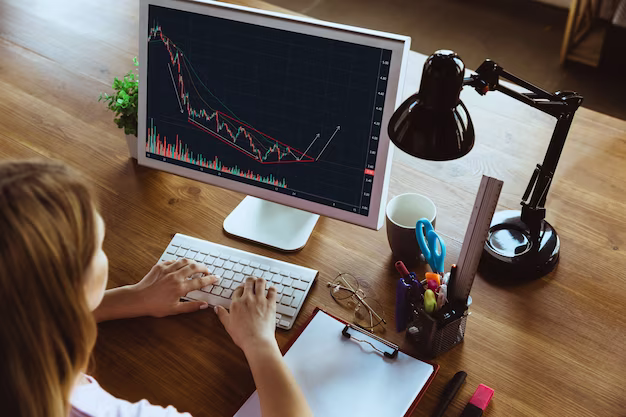Trading for a living has always held a unique allure, attracting individuals from various walks of life. It’s a profession that often aligns with the ideal job criteria due to its numerous advantages, but it’s equally important to maintain a realistic perspective when embarking on the path to becoming a full-time trader.
For many, the pursuit of elite-level trading is synonymous with chasing “The Dream.” This aspiration varies from person to person, often stemming from a desire for fulfillment that their current occupation lacks. Some are enticed by the prospect of independence, the absence of a boss, or rigid work hours. Others value the flexibility to work from home and spend quality time with family. A select few view trading as an opportunity to traverse the globe while continuing their work. Of course, financial rewards also entice many, as trading offers boundless possibilities for those who possess skill and consistency.
No Free Ride
Becoming a full-time trader doesn’t equate to rapid wealth accumulation or shortcuts to success, even though these notions initially attract many to the profession. If your goal is “easy money” within days or weeks, or if you’re unwilling to invest the time and effort required to master a new skill, then trading may not be the right fit for you. Proficiency in trading, like mastering a musical instrument or excelling in a new sport, is not achieved overnight.
In most professions, hard work, and a clear vision are rewarded. Trading is no different. It offers limitless potential to traders who can identify their strengths, learn from their mistakes, and remain humble in their pursuit of professional and personal growth.
Based on my experience with aspiring traders over the years, the trading world effectively separates those who are committed to self-improvement and ongoing skill development from dabblers.
For those with determination and motivation, the path to becoming a trader involves developing a clear plan and staying focused until their trading goals are met.
Personal and Professional Growth as a Trader
Becoming a professional trader is a formidable challenge, much like mastering any other skill. However, with careful planning, focus, and a comprehensive understanding of the markets, you can mitigate many of the pitfalls associated with trader development. Challenges will arise along the way, but developing trading skills is akin to honing any other skill.
Setbacks may occur, and plateaus are not uncommon, but periods of remarkable growth and profitability will follow as you progress as a trader. With unwavering focus and adherence to the path taken by successful professional traders, you can transition into full-time trading.
Given that there are no shortcuts without commitment and dedication, aspiring full-time traders should ask themselves, “What will make the effort worthwhile?” For some, the passion for trading stems from continually tackling fresh challenges and demonstrating self-discipline and trust in their plans. Trading is both a puzzle to be solved and a test of self-discipline and confidence. Successfully overcoming these challenges can be incredibly satisfying, with profits serving as a bonus.
For many aspiring traders, the primary benefits revolve around professional freedom. This may involve working for only a few hours in the morning to spend more time with family or taking weekdays off to focus on other pursuits. Some traders elevate their career flexibility by working remotely and traveling the world, as trading can be conducted from anywhere with an internet connection. While the working world becomes increasingly connected and online, trading still offers a level of freedom rarely found in other professions.

Becoming a Full-Time Trader
Regardless of your ultimate trading goals, the journey itself is what truly matters. To ensure success, stack the odds in your favor by adopting the best possible approach. While the path to achieving your trading goals may be filled with ups and downs, several key elements can smooth the journey.
Distinguishing Between Reality and Hype
Setting realistic expectations is crucial. Beware of marketing claims promising astronomical returns in a short time frame. Such unrealistic expectations often lead traders to take excessive risks too soon, driven by greed and anxiety. Seasoned traders focus on risk management and disciplined plan execution. They understand that controlling these aspects will naturally lead to profits over time.
Stick to Your Trading Plan
A well-defined trading plan is essential. Know the setups you seek, how to enter and manage trades, and how to respond to price movements in your favor or against you. Emotions can cloud judgment for novice traders, leading to oversized losses and small gains. Discipline and a clear plan with defined rules can counter these emotions and build confidence.
Honest Self-Review
Reviewing your trading performance is crucial for development. Don’t let losses deter you; they are part of the process. Embrace losses as learning opportunities and focus on improvement. Experienced traders evaluate their results and adapt as needed to achieve long-term success.
Master Your Trading Edge
Avoid the trap of constantly switching trading systems after a few losses. Experienced traders take a broader view, recognizing that single trades or days are insignificant. They focus on a larger sample of trades to maintain a positive trading expectancy over time. Confidence in their methods and discipline allows them to adhere to their plan and trust their trading edge.
The Importance of Money Management
Effective money management is essential. Limiting risk and focusing on high reward-to-risk ratio opportunities are key to long-term success. Professional traders understand the significance of managing risk and strive to avoid large drawdowns in their accounts.
The STA Development Philosophy
Trading has evolved, but challenges persist. The rise of online platforms, including YouTube, has increased access to trading information, but quality guidance on managing real-time trades remains scarce. Technical indicators are valuable tools, but they require context for effective use.
Realistic views on trader development are essential. While there are ways to expedite the learning process through valuable resources and adaptable trading systems, there is no substitute for investing time and effort to understand the markets and trade effectively.
To become a full-time trader, be prepared for a comprehensive learning and development journey, complete with challenges. The rewards are immense, and persistence can lead to limitless opportunities in this profession.
Trading Strategies and Techniques
When embarking on the journey to become a full-time trader, it’s essential to have a robust set of trading strategies and techniques at your disposal. These strategies are the building blocks of your trading plan and can significantly impact your success. Here are some common trading strategies and techniques:
- Day Trading: Day traders buy and sell financial instruments within the same trading day. They aim to profit from short-term price fluctuations, often focusing on small, frequent gains;
- Swing Trading: Swing traders hold positions for several days or weeks, capitalizing on price swings within larger trends. This approach requires patience and the ability to identify potential turning points in the market;
- Trend Following: Trend-following strategies involve identifying and trading in the direction of prevailing market trends. Traders use technical indicators and trend analysis to make informed decisions;
- Scalping: Scalpers seek to profit from very small price movements by executing a large number of trades in a single day. They rely on rapid order execution and often use leverage to amplify gains;
- Options Trading: Options provide traders with the flexibility to hedge their positions, generate income, or speculate on future price movements. Options strategies can be complex and require a deep understanding of the options market;
- Algorithmic Trading: Algorithmic or automated trading uses computer programs to execute trading strategies automatically. Traders design algorithms to analyze data, make decisions, and place orders.

Trading Tools and Resources
To succeed as a full-time trader, you must utilize various tools and resources that can aid in research, analysis, and execution. Here is a list of essential tools and resources commonly used by professional traders:
| Tool/Resource | Description |
|---|---|
| Trading Platform | A reliable trading platform with real-time market data and order execution capabilities. Popular platforms include MetaTrader, thinkorswim, and TradingView. |
| Market Data Providers | Subscribing to accurate and up-to-date market data feeds is crucial for making informed decisions. Bloomberg Terminal, Reuters, and market-specific data providers are commonly used. |
| Charting Software | Advanced charting tools help traders analyze price movements and identify trends. TradingView, NinjaTrader, and MetaTrader offer comprehensive charting capabilities. |
| Economic Calendars | Access to economic calendars is vital for tracking important economic events and announcements that can impact markets. Websites like Forex Factory and Investing.com provide such calendars. |
| News Sources | Staying informed about global events and market news is essential. Financial news outlets like CNBC, Bloomberg, and Reuters offer real-time updates. |
| Trading Education | Continual learning is crucial. Traders can access online courses, webinars, books, and forums to enhance their knowledge and skills. Platforms like Udemy and Coursera offer relevant courses. |
| Risk Management Tools | Risk calculators and position-sizing tools help traders manage their risk effectively. Online calculators and software like MyTradeSize can be useful. |
| Trading Journals | Keeping a trading journal to record trades, strategies, and emotions can aid in performance analysis and improvement. Excel or dedicated trading journal apps serve this purpose. |
| Brokerage Services | Choosing a reputable broker with competitive fees, a range of trading instruments, and reliable customer support is essential. Well-known brokers include Interactive Brokers, TD Ameritrade, and IG Group. |
| Trading Community | Joining a trading community or forum allows traders to share insights, seek advice, and discuss market developments. Websites like Forex Factory and Elite Trader provide such platforms. |
Conclusion
In conclusion, the path to becoming a full-time trader requires a blend of effective trading strategies, risk management techniques, and the utilization of valuable tools and resources. By honing your skills and continually expanding your knowledge, you can increase your chances of achieving success in the world of trading. Remember that patience, discipline, and a commitment to ongoing learning are keys to long-term profitability in the financial markets.



